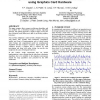119 search results - page 7 / 24 » An analysis of massively distributed evolutionary algorithms |
MDM
2001
Springer
13 years 11 months ago
2001
Springer
An system-level power management technique for massively distributed wireless microsensor networks is proposed. A power aware sensor node model is introduced which enables the embe...
PAMI
1998
13 years 6 months ago
1998
—We propose a general synchronous model of lattice random fields which could be used similarly to Gibbs distributions in a Bayesian framework for image analysis, leading to algor...
GECCO
2008
Springer
13 years 7 months ago
2008
Springer
This paper compares three common evolutionary algorithms and our modified GA, a Distributed Adaptive Genetic Algorithm (DAGA). The optimal approach is sought to adapt, in near rea...
TPDS
1998
13 years 6 months ago
1998
—A massive volume of biological sequence data is available in over 36 different databases worldwide, including the sequence data generated by the Human Genome project. These data...
GECCO
2008
Springer
13 years 7 months ago
2008
Springer
In evolutionary algorithms, the typical post-processing phase involves selection of the best-of-run individual, which becomes the final outcome of the evolutionary run. Trivial f...


